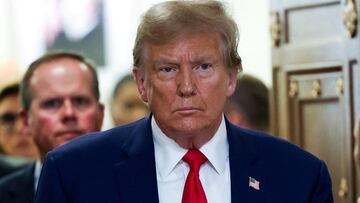Why is the judicial system so slow and how does Trump take advantage of it for immunity?
The US Constitution guarantees the right to a speedy trial but Trump quite prefers for the wheels of justice to grind along slowly in his criminal trials.

The Supreme Court announced that it will take up former President Donald Trump’s claim that he is shielded from prosecution based on immunity. He has been charged with two federal felonies for plotting to overturn the 2020 election results. The trial had been scheduled to begin 4 March, but delaying tactics by his legal team have put it on hold indefinitely.
The decision by the Supreme Court to have the final word after a three-judge panel in a lower court ruled that Trump does not have immunity will further push back the start date for that case in Washington DC. In essence it is a win for the former president, who is facing four separate criminal trials, as a verdict may not be handed down until after the November 2024 general election, if at all.
Why is the judicial system so slow and how does Trump take advantage of it for immunity?
The judicial process seems to be grinding along at a slow pace, especially with the 2024 general election fast approaching. It took seven months from the time that special counsel Jack Smith was appointed to the first charges leveled against Trump in Florida for retaining classified documents and refusing to return them. There will be a key hearing on Friday for that trial’s schedule.
But those charges were not the first, in April 2023 New York prosecutors unveiled 34 felony criminal charges against Trump in the hush money cover-up to influence the 2016 election. The trial in that case is set to begin 25 March.
Trump was indicted two more times in August, once again by Smith, this time in Washington DC, and then by Fulton County District Attorney Fani Willis in Georgia. Both of those cases revolve around Trump’s involvement in trying to overturn the legitimate results of the 2020 election. But due to scheduling it had seemed that the federal case in DC had the best chance of getting to trial first and potentially before the 2024 election.
However, Trump has been trying to delay all of his trials until after the election in November when he could potentially avoid accountability if re-elected. For good reason too, with a Bloomberg and Morning Consult poll finding in early February that over half of voters in swing states would be unwilling to cast a ballot for him if convicted. Over 20 percent of Republican respondents held the same view.
The Supreme Court can move rather quickly when it wants to, but normally decisions take months to issue. The justices will hear arguments on 22 April on Trump’s immunity claims. The ruling could come any time thereafter before the end of this year’s term at the end of June.
Smith has asked the justices to be expeditious in resolving the matter and argued against further delay in briefs to the court. “It is of imperative public importance that respondent’s claims of immunity be resolved by this Court and that respondent’s trial proceed as promptly as possible if his claim of immunity is rejected,” Smith stated in a filing in December asking the Supreme Court to take up the same issue which was rejected at that time.






